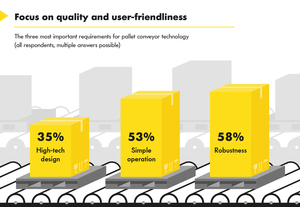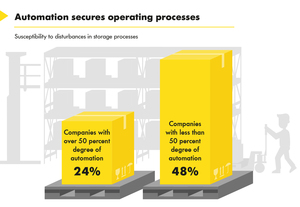

|
Edward Lowton
Editor |


|
| Home> | Handbooks | >Manufacturing Matters Ireland | >Survey prompts new pallet mover |
| Home> | Handling and Storing | >Pallets and ancillaries | >Survey prompts new pallet mover |
Survey prompts new pallet mover
22 May 2020
There is still a high potential for increasing productivity in medium-sized German manufacturing companies, with fewer than one in five achieving greater than 75% automation for internal material flow, according to a survey conducted by Interroll in Germany in 2019.

At the same time, the survey found that end-users attach particular importance to simple and robust systems for pallet handling.
Automation and robotics are key technologies for greater competitiveness, quality and sustainability in industrial production. In order to optimally tap the productivity potential of these technologies, the internal flow of materials plays a central role. This applies not only to the supply of materials to assembly lines or robots, but also to the most seamless connection of storage and picking areas with incoming and outgoing goods. Most large companies have recognised this challenge. But what is the actual situation with automation in medium-sized companies?
Only a minority is already highly automated
Interroll's survey 'Production Logistics in Medium-sized Companies' identifies a clear need to catch up in this area: The average degree of automation of internal material handling at the companies surveyed is only 53%. Not even one in five companies (19%) achieves a level of automation of over 75 percent for these processes. Almost one in 10 companies (9%) has been very reluctant to invest in these processes and has an automation level of just under 25%. In the case of handling processes, this even applies to every fifth company. This situation in the companies suggests that there is a backlog demand for the appropriate equipment. If this reluctance to invest is not broken, these companies are likely to face competitive disadvantages in productivity.
Interestingly, the survey also shows this situation in the susceptibility of warehouse processes to failures, which the respondents reported. For example, in companies with a degree of automation of less than 50%, it doubles to 48% compared to 24% of companies with a higher degree of automation. But even those who automate are naturally not completely safe from disruption. Here, software malfunctions (40%) and the incorrect operation of complex systems (32%) are among the most frequent causes of impairment.
Simplicity and robustness are particularly important for users
Incidentally, easy operability of conveyor modules also plays an important role for the survey participants in pallet handling. Some 61% of the production planners even consider this feature to be the most important factor in these processes. Across all those surveyed, the durability and robustness of pallet conveyor technology (58%) accounts for the decisive advantage of a solution. And those who believe that those responsible in medium-sized companies are not open-minded about future trends are mistaken: 67% consider predictive maintenance and professional service to be the most important criterion for ensuring smooth production processes, even before applications with a long service life (53%) and modularised products (50%).
In the survey commissioned by Interroll and conducted by the agency Faktenkontor (Hamburg), a total of 200 production companies in Germany were surveyed by telephone in 2019. The focus was on companies with 50 to 500 employees and a turnover of up to 500 million euros. The companies came from a wide range of sectors, including mechanical engineering and the food and consumer goods industry. Technical decision makers, such as technical managers, production managers and production planners were particularly addressed.
With the results of this survey in mind, Interroll is actively working on a new solution – the Smart Pallet Mover (SPM) – to better organise and automate the 'last mile' in manufacturing areas.
This new interface will improve the connection between the different phases of the material flow – the movement, organisation, input and output of pallets. The SPM can be deployed not only in proximity to manufacturing machines but also between different production cells within the same manufacturing process.
Find more information, visit: https://www.interroll.co.uk/products/spm/
- Interroll showcasing conveying and sorting solutions
- Parcel throughput boosted with crossbelt sorter
- Tapered elements secured from inside
- Interroll expands belt curve offering
- Synchronous drum motor boosts salmon slicing
- Synchronous drum motor
- Efficiency improvements
- Fexibility boosted with new Carton Wheel Flow
- New belt curve
- Dynamic storage solutions



















